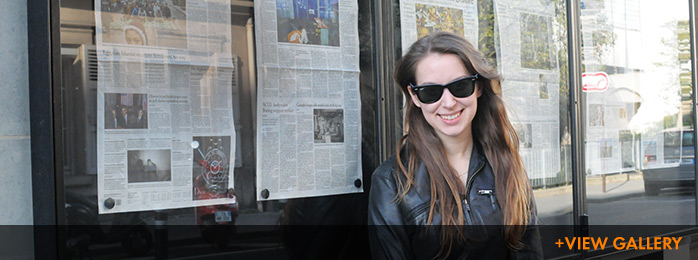How I Came to Cover 'The Beat of the Future'
I ended up as a journalist based in Paris by watching too many episodes of "House, M.D." While that might seem like an exaggeration, it’s not that far from the truth. When I came to Northwestern in fall 2007, I was intent on becoming a doctor despite years of schooling that told me I excelled in English and was no Harvey Cushing. (Cushing is considered one of the fathers of modern neurosurgery, and his biography, "A Life in Surgery", held a special place on my overstuffed bookshelf for months.)
Then reality intervened. Although I loved my neuroscience courses freshman year, I quickly dropped premed (general chemistry left me in tears), and, in search of a major, ended up in the philosophy department. After just two classes I declared the major and went on to create an ad hoc major in bioethics—studying the ethics of medical decisions. As part of my double major, I also studied the ethics of resource allocation around the globe, examining the differences between medical care in the developing world and the developed world.
All this, and not a single thought of being a journalist.
I added a global health minor and spent fall 2010 studying at Sciences Po in Paris completing the Global Health in Europe program. Ten days earlier, I had returned from India, where I worked with a local NGO as part of the GESI program studying traditional medicine and experiencing life in a rural village halfway across the world.Yet part of me still clung to my dream of becoming a doctor. While in Paris, I’d regretted my decision to quit premed. I reread "Mountains Beyond Mountains", the story of Dr. Paul Farmer trekking through the Haitian mountains and Russian prisons to care for patients, and wondered why I’d stopped pursuing medicine as a career. As I devoured the text, though, for a split second I thought that it was not Dr. Farmer whom I wanted to emulate, but rather the book’s author, Pulitzer Prize-winner Tracy Kidder.
When I returned to campus in January, I met with my adviser, Mark Sheldon. I was unsure of what to do with my life and panicked over my impending June graduation. Half my classmates seemed to have found jobs while I was gallivanting through Europe. In the middle of rambling about possible career paths, I told Professor Sheldon how much I had enjoyed blogging for www.the195.com, Northwestern’s travel blog, created by Medill students.
He suggested that I consider becoming a journalist who focused on writing about the very issues I’d spent four years studying—global health and bioethics.
Suddenly, journalism was the new premed. Through the School of Communication, I found out about an international media seminar hosted by Northwestern in Paris over spring break. It became my full-time job to find grant money to buy a plane ticket to Paris, where I could sleep on the couch of a friend made during study abroad. Both the philosophy and global health departments enthusiastically gave me financial support, and I booked the ticket.
While in Paris, I visited the offices of the International Herald Tribune, the global edition of the New York Times, where I would become an intern six months later. Still unsure about whether or not covering health and science was important, I was thrilled when a senior editor asked the interns if anyone was majoring in biology—or considering writing about medicine for their career.
“I truly believe that’s the beat of the future,” she told me, saying that medical writing would be one of the most important areas a journalist could cover in the coming years.
When I arrived in Paris, though, I soon found that writing about medicine was not limited to stories that appeared on the health and science pages of the Tribune and the Times. In fact, I couldn’t write for those pages—the health and science editor in Paris wasn’t fond of pitches from interns. Luckily, my global health courses had taught me that health is nothing if not interdisciplinary and multifaceted. Professors throughout the department had shown me how economics, politics, and education all play a role in health.
The business and education editors agreed with that approach, and in February of this year, the same editor who applauded the idea of writing about medicine published my first business article, about how the euro crisis was impacting the European pharmaceutical market. I also wrote for the education pages and recently interviewed none other than Paul Farmer for stories about global health education and Rwanda’s success in providing healthcare to its poor.
The opportunities for healthcare journalism are everywhere, I have learned. Medicine is “the beat of the future” because everything relates to health, and healthcare is something that eventually impacts everyone, whether the story is about medicine directly or the politics and economics that surround healthcare decisions.
After the global health department and my undergraduate studies at Northwestern taught me about the many dimensions of health, I couldn’t imagine being anywhere but here to continue on the journalism path. I left Paris last spring in order to start a master’s degree in journalism at Medill, where my professors and I have already talked about the many different ways to report about medicine, health, and science in order to have the greatest impact on our audience. And best of all, I’ll get to meet Paul Farmer in person this year after he speaks at Northwestern’s Commencement.
Back to top